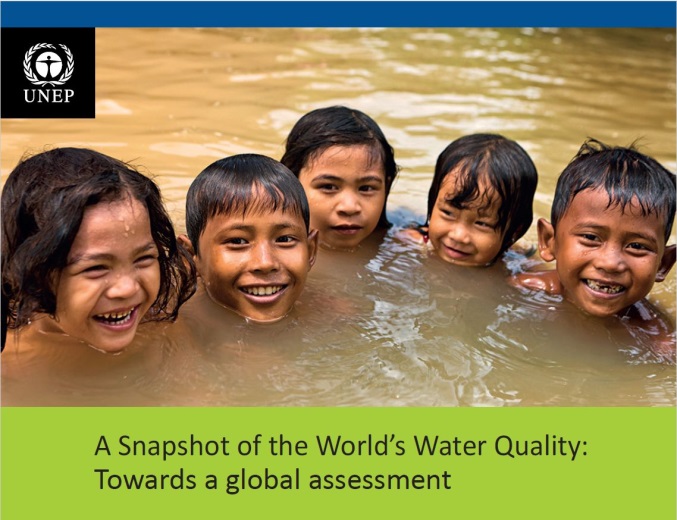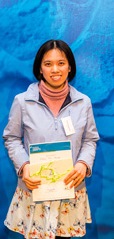Newsletter 05/2016
Research
Approval of DFG-project „Greenhouse Gas Emissions from Reservoirs (TregaTa): Mechanisms and Quantification“
Copyright: Martin Wieprecht, UFZ
Within the DFG funded project „Greenhouse Gas Emissions from Reservoirs (TregaTa)” CAWR-scientists are investigating the mechanisms of carbon dioxide (CO2) and methane (CH4) emissions from inland waters and especially reservoirs. The reservoirs Bautzen in Saxony and the Rappbode reservoir in the Harz mountains will be used as a playground for the quantification of the greenhouse gas emissions within the moderate climatic zone. The central research topic is the understanding of the regulation of CO2 and CH4 emissions by changing water levels, trophic state and meteorological drivers like wind, air pressure, radiation, and energy balance. The project will strengthen the collaboration between the research fields limnology, hydrology and boundary layer meteorology. The project is going to start in November 2016. CAWR seeks for a PhD candidate, who is working in the Department Lake Research, UFZ. More information here.
Contact:
matthias.koschorreck@ufz.de
,
uwe.spank@tu-dresden.de
Towards a better water quality– CAWR-scientists are presenting a Worldwide Water Quality Assessment at a Science-Policy Forum of the United Nations Environment Assembly (UNEA) in Nairobi
 Foto: UNEP (Bartosz Hadynia)
On behalf of the United Nations Environment Programme (UNEP), scientists of CAWR in collaboration with scienstists of University Kassel were collecting knowledge concerning the quality of river systems and lakes worldwide. The study 'A Snapshot of the World's Water Quality: Towards a Global Assessment' coordinated by UFZ and with contribution of more than 30 authors was launched on May 19th during a Science-Policy Forum of the United Nations Environment Assembly (UNEA) in Nairobi. In this context 150 scientists, politicians and actors from civil society discussed, inter alia, how scientific results can be better taken into account in future policy making within the 2030 Agenda of Sustainable Development. More information concerning the project “World Water Quality Assessment” here.
Foto: UNEP (Bartosz Hadynia)
On behalf of the United Nations Environment Programme (UNEP), scientists of CAWR in collaboration with scienstists of University Kassel were collecting knowledge concerning the quality of river systems and lakes worldwide. The study 'A Snapshot of the World's Water Quality: Towards a Global Assessment' coordinated by UFZ and with contribution of more than 30 authors was launched on May 19th during a Science-Policy Forum of the United Nations Environment Assembly (UNEA) in Nairobi. In this context 150 scientists, politicians and actors from civil society discussed, inter alia, how scientific results can be better taken into account in future policy making within the 2030 Agenda of Sustainable Development. More information concerning the project “World Water Quality Assessment” here.
Contact:
Dietrich.borchardt@ufz.de
,
ilona.baerlund@ufz.de
First Status Seminar of BMBF project “Urban Catchments” in Leipzig
The first status seminar of the BMBF Client project „Managing Water Resources for Urban Catchments“ took place on April 19th 2016 in Leipzig. Goal of the project is the development of a concept for a drinking water early warning system for the Chinese city Chaohu, which is supplied with water from the identically named lake. A discharge of pollutants to the lake is resulting in a massive increase of blue-green algae especially during summertime, which is having an enormous impact on the drinking water supply of the population and the city Chaohu. Within the first year of the project the project team was able to tackle important milestones like the setup for modelling the urban water system and the lake as well as the development of planning and biomonitoring tools. Furthermore the first version of an environmental information system including an online data connection to the “Urban Catchments”-monitoring systems as well as the 3D visualization could be realized. The cooperation with the Chinese partners could be strengthened through the collaboration within the CAWR-project. More information concerning “Urban Catchments” here.
 Foto: ENVINF, UFZ
Foto: ENVINF, UFZ
Events
Johan Rockström (Stockholm Resilience Center) und John Smol (Queen’s University (Canada)) as keynote lecturer at the Water Research Horizon Conference in Dessau
The 7th Water Research Horizon Conference is going to take place from June 28th -29th 2016 at Federal Environmental Agency in Dessau-Rosslau and is jointly organized by the Water Science Alliance e.V. and Federal Environmental Agency (UBA). The topic of the conference is “Water Quality in a Changing World” and will focus on the effects of global change on water quality as well as on the aquatic systems responses and options for adaptation. The soundness of scientific knowledge to predict cause-effect relationships, the suitability of policies to achieve good water quality, their effectiveness and flexibility in the face of changes as well as the opportunities of existing and advanced technologies to reach these goals will be discussed. More information here.
Magdeburger Gewässerschutzseminar 2016 in Dresden
The 17th Magdeburger Gewässerschutzseminar is going to take place on October 6th – 7th 2016 in Dresden focusing on the topic “The Elbe River and its urban affected waters”. The Magdeburger Gewässerschutzseminar is organized by scientists of the CAWR and the International Commission for the Protection of the Elbe River (IKSE) and is contributing to the research in CAWR Thematic Field 3 “Urban Systems”. The conference language will be German and Czech. For registration for special rates is July, 31st 2016 please click here.
Faces of CAWR
PhD - Microbial sulfur transformations in constructed wetlands: Phuong M. Nguyen
 Constructed wetlands (CWs) are near-natural wastewater treatment systems. There, pollutant transformations are either direct components of or interlinked with the redox cycles of major chemical elements such as sulfur. A collaborative project of CAWR-scientist at the Department of Environmental Biotechnology, UFZ, and the Institute for Microbiology at the TU Dresden aims at identifying key microbes that are drivers for dynamic sulfur transformations in CWs. Since April 2013, DAAD-financed PhD student Phuong M. Ngyuen from Hanoi, Vietnam, has been applying a battery of classical and molecular methods on CWs to dissect the complex microbial communities in such planted water treatment systems. Using her multi-phasic approach, Phuong could describe the interplay between certain sulfur-metabolizing microbes and plants. This knowledge helps in enhancing wastewater treatment in CWs.
Constructed wetlands (CWs) are near-natural wastewater treatment systems. There, pollutant transformations are either direct components of or interlinked with the redox cycles of major chemical elements such as sulfur. A collaborative project of CAWR-scientist at the Department of Environmental Biotechnology, UFZ, and the Institute for Microbiology at the TU Dresden aims at identifying key microbes that are drivers for dynamic sulfur transformations in CWs. Since April 2013, DAAD-financed PhD student Phuong M. Ngyuen from Hanoi, Vietnam, has been applying a battery of classical and molecular methods on CWs to dissect the complex microbial communities in such planted water treatment systems. Using her multi-phasic approach, Phuong could describe the interplay between certain sulfur-metabolizing microbes and plants. This knowledge helps in enhancing wastewater treatment in CWs.
Contact: phuong-minh.nguyen@ufz.de , jochen.mueller@ufz.de

